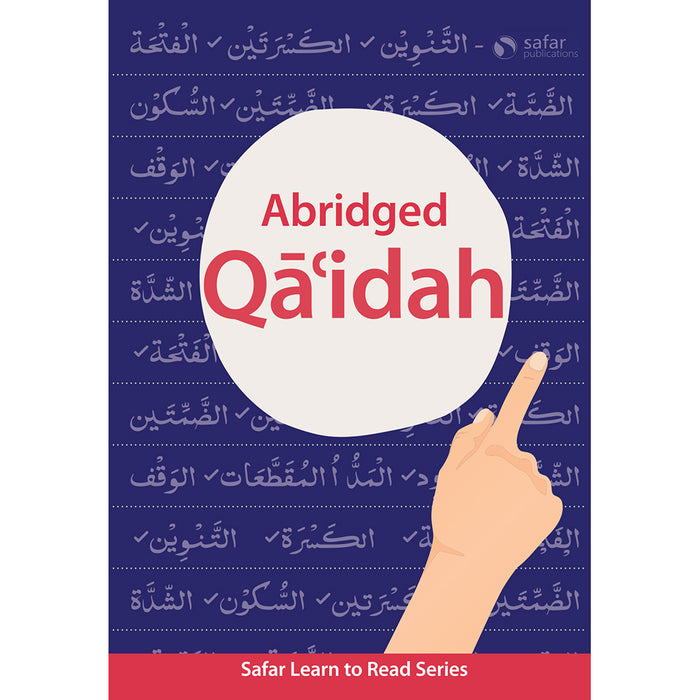At Safar Academy we use our own unique qaʿidah compiled by our Development Team which is now taught in many madrassahs across the UK. This qaʿidah draws from numerous other qaʿidahs from around the world and contains many new, innovative features based on years of collective experience gained by teaching students at Safar Academy.
In this abridged version of our complete qaʿidah we have kept most of the unique strengths of the complete qaʿidah and presented it in a shorter and smaller size.
Unique Features
We found that most other qaʿidahs do not have any chaptering or breakdown of learning objectives. The students, and sometimes teachers, progress from one exercise to another without realizing what the goals behind them were. This lack of breakdown of objective is also unhealthy for the student’s morale as they have no short-term targets to work toward and can lose motivation. Therefore, the
Safar Qaʿidah has been divided into several sections with each being called a level. In each level, a new skill or topic will be introduced and covered. The level system has proved to be very effective in motivating students.
In selecting examples for each exercise, certain considerations have been taken, like not allowing too many examples to follow a single vocal pattern. This is to avoid students guessing the pronunciation of an example based on the last one, when they are supposed to work out each example separately. We have also tried to make sure that not a single example contains any elements that they have not yet covered. For example, no examples will have fathas until fatha has been formerly introduced. Likewise, examples containing ikhfa have been left out until the student has learned about ikhfa, and so on. We then arranged the examples in each exercise so they progress from the easiest to the most difficult, taking into consideration the number of letters or words in the examples as well as the weight and difficulty of the letters.
A complete overview of the Qaʿidah and the
Learn to Read series can be found here.
The differences between the
Abridged Qaʿidah and the
Complete Qaʿidah can be viewed here.
Quranic Examples
The words in the Quran are Allah’s (swt) words. This not only makes their recitation more rewarding in the hereafter, but we also believe they have a positive impact on the student’s learning and progress; Allah (swt) said, "We have made the Quran easy to remember" (54:40). In most other qaʿidahs, we found that many words had crept in which were not found in the Quran. This is by no means incorrect, but the words of the Quran will always hold superiority. Some qaʿidahs have tried to use examples only from the Quran but have either not found enough examples for the students to master the level, or they have had to make slight alterations to the writing to make it fit the level. For example, sometimes people have written a standing kasrah instead of a ya, or taken a word written together in the Quran and omitted part of it. We were not content with all of the above mentioned, so we carried out a comprehensive survey of the Quran, to the best of our abilities, combining direct human efforts and modern technological aids, to find ample examples from the Quran for each level. Occasionally, we have removed the waw of from the beginning of some individual words, but have not made any other changes to the text.
Complete Syllabus
Reciting the Quran correctly involves many elements that are beyond the remit of a qaʿidah: students require much practice to build their fluency, as well as time to learn and implement the complex rules of tajweed. At Safar, we have kept the qaʿidah as an independent publication at the same time as integrating it into to a comprehensive syllabus that takes a student from his introduction to the sounds of Arabic letters, all the way through to expert recitation. By doing this, teachers, parents, and students are able to keep a holistic view of progress and ensure no aspect is neglected.
Complete and Logical sequence
The ability to recite the Quran is dependent on several individual skills: for example, the ability to recognize joined letters, the ability to regulate the length of each vowel, and so on. In our analysis of other available qaʿidahs, we noticed that most of them contain gaps where certain key elements have not been covered formally and students are expected to guess or understand themselves. Sometimes, the logical sequence of this learning has also been ignored with some elements being presented in inappropriate places. Sometimes, examples contain concepts and elements which have not yet introduced to the students causing confusion and obstacles for the students.
To solve this, each level in the
Safar Qaʿidah is a gradual and logical progression from the previous one. An effort has been made to fill any gaps in that exist in other qaʿidahs, as well as trying to not allow any elements not yet formally covered into the examples. To add to this, students are given mixed exercises at the end of each level, to revise and recap everything they have learned previously.

























